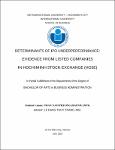| dc.description.abstract | Vietnam's first share issuance market (IPO) reached US $ 4.5 billion in 2018, as of mid-November. According to data from global audit firm Deloitte, the total capital that Vietnamese enterprises mobilized through IPO this year far exceeded the number of only a few hundred million US dollars mobilized in recent years, making Vietnam the largest IPO market in Southeast Asia. The emergence of Vietnam's capital market is partly due to the promotion of the restructuring of the Government market, accompanied by strong interest of foreign investors and domestic investment funds. , along with a positive economic growth forecast of 6.8% in 2018. However, many IPO deals face many difficulties in finding investors, as well as finding long-term business strategies. The term leads to a decline in stock performance after IPO. This study focuses on the existence of Underperformance IPO on HOSE and the factors affecting this phenomenon. Due to limited time and professional knowledge, the research results only prove the existence of the Underperformance IPO on a very small scale (about 2.2%) and 2 factors affecting this phenomenon are Leverage (with impact level of about 25.4%) and ROA (with an impact level of 32.4%). | en_US |


